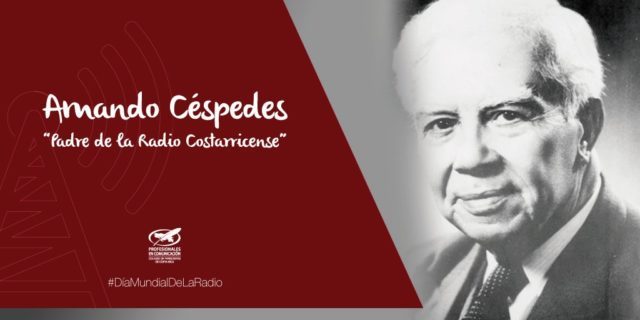Amando Céspedes Marín; He was born on August 1st, 1881, in San José, Costa Rica. He was one of the most relevant photographers and broadcasters of the first two decades of the 20th century, considered the pioneer of radio broadcasting in Costa Rica.

As a child, his family moved to Puerto Limón, where the young man quickly learned the English of the foreigners who arrived at the port. Taking advantage of his extensive knowledge of the Anglo-Saxon language, rare in those days, Amando Cespedes earned money in his free time teaching English to the inhabitants of the region, mainly the Costa Rican, Spanish and Jamaican workers who frequented the port.
He began his secondary education at the Liceo de Costa Rica. His desire for improvement led him to the United States of America, where he spent his youth, graduating from Illinois College, in the city of Chicago, as a Professional in Photographic Art.
On his return to his native country, returning with much desire to overcome and achieve his career, he brought with him a steam carousel that he installed in the port. This activity allowed him to raise 3000 colones the first night that at that time was a considerable amount.
Armando worked as a photographer, which allowed him to establish his own photography studio in San José from 1900 to 1926
Likewise, his broad university career allowed him to edit different magazines besides venturing into the filming industry of Chicago while there, then back in his native country he made some films for public exhibition in the year 1912, hence the first newsreels of Costa Rica, were made by him.

In the mid-1920s he made an effort to study science, this brought him to the radio hand in hand with his work to improve Costa Rican culture. He also worked for the Herald newspaper in New York and in published the first news report in the country, the book The Cartago Earthquake, which included texts by León Fernández in English and Spanish versions.
His life as a great radio broadcaster
In 1923 he received the first radio signals in the country by means of a bamboo antenna; by which he maintained communication with the expeditionary Admiral Richard Evelyn Byrd, with which the established radial chain became legendary;
On December 24, 1927, he carried out the first long-wave radio transmission; In the early years of the 1920s he maintained an active communication channel between San Jose and San Pedro through a 5-watt transmitter-receiver and had a small station that operated with the acronym of NRH.
In 1911 with Manuel Gómez Miralles, they became the pioneers of cinema in Costa Rica and did the filming of The Eucharistic Congress. Hired by the Variety Theater, he produced the first national newscasts, the Céspedes-Journal, which were weekly productions that included views of different parts of the country.
It is important to know
During the government of Mr. León Cortés Castro, period 1936 to 1940, the President requested Don Amando, to outline a plan to establish the National Department of Photography, to carry out identity identification with the photograph of each person at a national level.

In 1971, Dr. Manuel A. Cassartelli, Dean of the University of Córdoba, proposed the name of the Costa Rican Don Amando, for the Nobel Peace Prize. He received much support from his fellow countrymen, hence he received more than thirty-five thousand nomination letters send to the Office of the Secretary of Oslo. Until then the Costa Rican was the only one proposed, but for political motives, the prize was given to Germany.
”La Casa del Benemérito de la Patria Armando Cespedes”, is located in the center of the province of Heredia, at the church of El Carmen 100 South and 125 West. On the outside, a commemorative plaque was placed by the Municipality in honor of the pioneer of the Costa Rican radio. Inside are several photographs of Cespedes with his family, also a bust of his face in the main room.
Death
Finally, he died in Heredia, on May 17, 1976, at the age of 95 years. With the great pride of being a great man of peace, ingenious pioneer of the countries and the world’s communications. Independent navigator of the Hertzian waves, globetrotter, simple-minded, gentle, friendly, eminently Costa Rican. There is much to be admired about Amando Céspedes Marín, a compatriot in love with radio, who opened the way for national broadcasting, and who in that task placed Costa Rica on the world map; establishing a reference that remains to this day.
